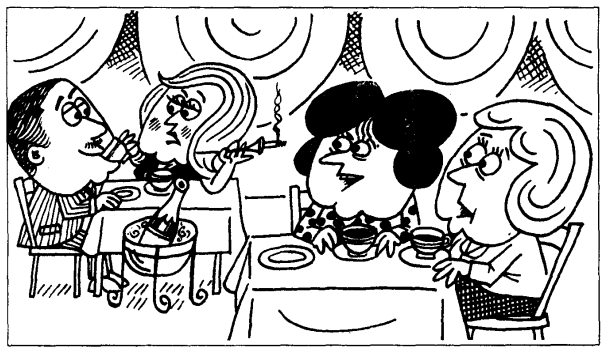one|Lesson 121~130
Lesson 121~122
✨课文

✨单词
定语从句
⚡本课重点
定语从句是一个相对较难的知识点,本节课主要先从汉语的角度来理解并构造定语从句
定语:参考基础概念中的定语。类似于汉语中对某种东西进行修饰限定,什么什么的就是一种定语,比如漂亮的女孩
关系代词:who、whom、whose、that、which
- 连接主句和从句,充当连接词
- 在从句中做句子成分,指代主语或宾语
who:用于指代人,进一步提供有关某人的信息。侧重于在从句中作主语whom:与who同义,作为动词或介词的宾语。只能在从句中作宾语whose:用于指代人或物,进一步提供信息时使用。侧重于在从句中作定语that:用于指代人或物,可以在从句中作主语、宾语或表语,只能引导限定性定语从句which:用于指代人以外的物,包括有生命或无生命的东西。可以在从句中作主语或宾语
定义从句:用一个句子来充当定语,去修饰限定另一个句子(主句)的中心词。被修饰限定的成分(名词/代词)叫先行词。先行词总是放在定语从句的前面,所以叫先行词
修饰人:关系代词用
who/whom/that。当先行词在从句中作主语时,只能用who或that;而作宾语时,可以用who、whom或that,甚至省略。在生活中,实际上人们更多是用whoe.g. 他就是昨天打电话给我的那个人
- ①分析句子可知,从句中「
昨天打电话给我的」修饰限定「那个人」 - ②根据分析结果将这句中文拆分成两个部分,He is the man. 和 The man called me yesterday.
- ③由于先行词
the man在从句中作主语,所以关系代词只能用who或that,且不能省略 - ④最后得到完整句子 He is the man who called me yesterday.
e.g. 他就是我昨天遇到的那个人
- ①分析句子可知,从句中「
我昨天遇到的」修饰限定「那个人」 - ②根据分析结果将这句中文拆分成两个部分,He is the man. 和 I met the man yesterday.
- ③由于先行词
the man在从句中作宾语,所以关系代词可以用who、whom或that,甚至省略 - ④最后得到完整句子 He is the man I met yesterday.
e.g. 他是杀了怪物的男人
- ①分析句子可知,从句中「
杀了怪物的」修饰限定「男人」 - ②根据分析结果将这句中文拆分成两个部分,He is the man. 和 The man killed the monster.
- ③由于先行词
the man在从句中作主语,所以关系代词只能用who或that,且不能省略 - ④最后得到完整句子 He is the man who killed the monster.
- ①分析句子可知,从句中「
修饰物:关系代词用
which/that。当先行词在从句中作主语或宾语时,可以用which或that;并且作宾语时甚至还能省略。在生活中,实际上人们更多是用whiche.g. 叼着篮子的那只狗是我的
- ①分析句子可知,从句中「
叼着篮子的」修饰限定「那只狗」 - ②根据分析结果将这句中文拆分成两个部分,The dog is mine. 和 The dog is carrying the basket.
- ③由于先行词
the dog在从句中作主语,所以关系代词可以用which或that,且不能省略 - ④最后得到完整句子 The dog that is carrying the basket is mine.
e.g. 这就是他寄给我的那封信
- ①分析句子可知,从句中「
他寄给我的」修饰限定「那封信」 - ②根据分析结果将这句中文拆分成两个部分,This is the letter. 和 He sent me the letter.
- ③由于先行词
the letter在从句中作宾语,所以关系代词可以用which或that,甚至省略 - ④最后得到完整句子 This is the letter he sent me.
e.g. 她的朋友可能找到了她不见的戒指
- ①分析句子可知,从句中「
她的朋友找到的」修饰限定「她的戒指」 - ②根据分析结果将这句中文拆分成两个部分,Her friend probably found her ring. 和 Her ring was missing.
- ③由于先行词
her ring在从句中作主语,所以关系代词可以用which或that,且不能省略 - ④最后得到完整句子 Her friend probably found her ring that was missing.
- ①分析句子可知,从句中「
修饰人或物:关系代词用
whose/that。当先行词在从句中作定语时,关系代词要用whose;当先行词为不定代词或由数词、最高级、the only、the very、the same、all所修饰,又或者是以who、what、which开头的疑问句时,关系代词只能用thate.g. 我的一个朋友的母亲是老师
- ①分析句子可知,从句中「
朋友的」修饰限定「母亲」 - ②根据分析结果将这句中文拆分成两个部分,I have a friend. 和 His mother is a teacher.
- ③由于先行词
a friend在从句中作mother的定语,所以关系代词要用whose - ④最后得到完整句子 I have a friend whose mother is a teacher.
e.g. 你住的那个小镇叫什么名字
- ①分析句子可知,从句中「
你住的」修饰限定「那个小镇」 - ②根据分析结果将这句中文拆分成两个部分,What's the name of the town? 和 The town you live in.
- ③由于先行词
the town在从句中作宾语并且是以what开头的疑问句,所以关系代词要用that - ④最后得到完整句子 What's the name of the town that you live in?
- ①分析句子可知,从句中「
Lesson 123~124
✨课文

✨单词
⚡本课重点
本节课主要学习定语从句中关系代词的省略
先行词是人
who+动词- He is the man who called me yesterday.,先行词
the man在从句中作主语,who不能省略 - The lady who is standing behind the counter served me.,先行词
the lady在从句中作主语,并且从句是进行时态,这个时候who和be均可省略 - He is the man who I met yesterday.,先行词
the man在从句中作宾语,who可以省略
- He is the man who called me yesterday.,先行词
whom+动词+prep.- The man whom I spoke to is my uncle.,先行词
the man在从句中作宾语,whom可以省略 - The man to whom I spoke is my uncle.,把介词
to提前的反习惯用法(正常人不会这么用),这个时候whom不能省略
- The man whom I spoke to is my uncle.,先行词
先行词是物
which+及物动词- The bus which takes us to school often breaks down.,先行词
the bus在从句中作主语,which不能省略 - The dog which is carrying the basket is mine.,先行词
the dog在从句中作主语,并且从句是进行时态,这个时候which和be均可省略 - This is the letter which I received yesterday.,先行词
the letter在从句中作宾语,which可以省略
- The bus which takes us to school often breaks down.,先行词
which+不及物动词+prep.- These are the books which I told you about yesterday.,先行词
the books在从句中作宾语,which可以省略,还可以用介词结尾 - These are the books about which I told you yesterday.,把介词
about提前的反习惯用法(正常人不会这么用),这个时候which不能省略
- These are the books which I told you about yesterday.,先行词
先行词是人或物
whose+名词:先行词在从句中作定语,whose不能省略- I have a friend whose mother is a teacher.,关系代词
whose指代My friend's,作mother的定语
- I have a friend whose mother is a teacher.,关系代词
that:除了适用who、whom和which的规则外,还有自己的特殊规则,例如先行词为不定代词或以who、what、which开头的疑问句,关系代词只能用that- What's the name of the town that you live in?,先行词
the town在从句中作宾语,that可以省略 - The hospital is around the corner is the one that we are going to.,先行词
the hospital在从句中作表语,that可以省略
- What's the name of the town that you live in?,先行词
感叹句:what+a/an+adj.+名词
- e.g. What a beautiful ship!、What an interesting program!
Lesson 125~126
✨课文

✨单词
have to
⚡本课重点
have to:这是英语语言习惯中的一个固定搭配用法,表示客观的「必须、不得不」。它是一个复合动词,有时态的变化,变化作用于助动词have,而在变为否定句和疑问句时要根据不同时态的助动词来处理;to后面接动词原形
一般现在时:适用主谓宾结构的一般现在时句式,三单形式也是。助动词分别是
do和does- I have to leave now.、He has to leave now.
- I don't have to leave now.、He doesn't have to leave now.
- Do you have to leave now?、Does he have to leave now?
- Why do you have to leave now?、Why does he have to leave now?
一般过去时:适用主谓宾结构的一般过去时句式,助动词是
did- I had to walk home last night.
- I didn't have to walk home last night.
- Did you have to walk home last night?
- Why did you have to walk home last night?
一般将来时:
will/shall+have to- I will have to stay at home taday.
- I won't have to stay at home taday.
- Will you have to stay at home taday?
- Why will you have to stay at home taday?
现在完成时:
have/has+had to- I have had to wait for you two hours.、He has had to wait for his friend two hours.
- I haven't had to wait for you two hours.
- Have you had to wait for me two hours?
- How long have you had to wait for me?
have to和must的区别
must:情态动词,没有时态变化,表示说话人主观看法。一般只能表达现在的必要性,不用来讨论过去have to:复合动词,有时态变化,表示说话人的客观需要或外界影响。可以表达过去、现在或将来的必要性- 否定表达完全不同:
mustn't表示「绝对禁止」,没有商量的余地;don't have to表示「不必」,有得商量。don't have to等价于don't need to - 如果想要对
must的提问来表达「不必」,则只能用needn't
Lesson 127~128
✨课文

✨单词
推测的表达方式
从127~132课将会学习不同的推测表达方式
⚡本课重点
must be:表示根据已经了解到的信息,对当前状况进行肯定的推测,概率接近100%,意思为「一定是」
must be+adj./n.e.g. He must be busy.、He must be a teacher.
must be+V.inge.g. You must be joking.、You must be having a bath.
must be+宾语从句e.g. You must be the boyfriend of that girl.
can't be:表示根据已经了解到的信息,对当前状况进行否定的推测,概率接近0%,意思为「一定不是」
can't be+adj./n.e.g. It can't be true.、He can't be a teacher.
can't be+V.inge.g. They can't be working.
can't+宾语从句e.g. You can't be the boyfriend of that girl.
not more than:表示「不超过」
Lesson 129~130
✨课文

✨单词
⚡本课重点
must have been:表示根据已经了解到的信息,对过去的状况进行肯定的推测,概率接近100%,意思为「(当时)一定是」,翻译时,根据上下文来决定是否加当时
must have+V.pp.e.g. You must have eaten my biscuits.
must have been+adj./n.e.g. He must have been busy.、He must have been a teacher.
must have been+V.inge.g. They must have been having a party.
must have been+宾语从句e.g. You must have been the boyfriend of that girl.
can't have been:表示根据已经了解到的信息,对过去的状况进行否定的推测,概率接近0%,意思为「(当时)一定不是」,翻译时,根据上下文来决定是否加当时
can't have+V.pp.e.g. You can't have eaten my biscuits.
can't have been+adj./n.e.g. He can't have been busy.、He can't have been a teacher.
can't have been+V.inge.g. They can't have been having a party.
can't have been+宾语从句e.g. You can't have been the boyfriend of that girl.
注意,这里的have been跟现在完成时没有任何关系,英语语言习惯就这样,就是个固定搭配
do you think:用在特殊疑问句中的插入语,用来征询见解或表达看法。插入语可以位于句尾或句中,有时也可以出现在一般疑问句中
- e.g. Will he be late for school, do you think?
must have been连读:发音为/mʌst hæv biːn/,h和v不发音
can't have been连读:发音为/kɑːnt hæv biːn/,h和v不发音